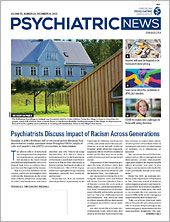Roughly 15% of patients who have an eating disorder also have a current diagnosis of obsessive-compulsive disorder (OCD), and 18% of those with an eating disorder will be diagnosed with OCD at some point in their lifetimes (lifetime comorbidity), a meta-analysis published in the Journal of Affective Disorders has found.
Anna-Rita Atti, M.D., Ph.D., M.A., an associate professor in the Department of Biomedical and Neuromotor Sciences at the University of Bologna in Italy, and colleagues pooled data from 32 studies that reported current comorbidity, lifetime comorbidity, or both current and lifetime comorbidity with eating disorders and OCD. Twenty-seven of the studies were cross-sectional and five were prospective. The prospective studies had follow-up periods ranging from several months to several years.
Data from the cross-sectional studies revealed that 14% of patients with anorexia and 9% of patients with bulimia had current comorbidity, and 19% of those with anorexia and 13% of those with bulimia had lifetime comorbidity. Data from the prospective studies suggested much higher prevalence of lifetime comorbidity: 44% of patients with anorexia and 19% of patients with bulimia.
The researchers noted that cross-sectional studies about eating disorders tend to include adolescents and young adults and that patients in prospective studies may be older. Therefore, the data from the prospective studies suggest that the occurrence of OCD in people with a history of eating disorders may be greater than the cross-sectional studies would suggest.
Although the analysis was not designed to tease out the relationship between eating disorders and OCD, the two conditions may share a common, underlying pathology, Atti told Psychiatric News.
“Patients who have both OCD and eating disorders, especially those who have anorexia, share a lack of cognitive flexibility that would enable them to adapt effectively to changes in the environment or to changing demands,” Atti explained. “This could be the common starting point of a combined intervention for both disorders.”
Walter H. Kaye, M.D., Distinguished Professor of Psychiatry in the Department of Psychiatry at the University of California, San Diego (UCSD), agreed that there is an overlap in traits among patients with eating disorders and those with OCD. He is the founder and executive director of the UCSD Eating Disorder Research and Treatment Program.
“If you look at people with both [disorders], you’ll see there is an emphasis on symmetry, exactness, and order. They don’t like to make mistakes,” said Kaye, who was not involved in the research.
Last year Kaye and his colleagues published research in the European Eating Disorders Review that explored the psychological and personality factors shared by people with anorexia and OCD. They examined data from 732 women who either currently had anorexia or who had recovered from anorexia and found that a concern over mistakes was common to core dimensions of both anorexia and OCD, such as obsessions, compulsions, body dissatisfaction, and a drive for thinness. However, they did not determine whether concern over mistakes is a risk factor for these core dimensions or a consequence of experience with the symptoms that define the disorders.
Kaye said that patients who have one condition should be screened for the other because of the overlapping concern for mistakes and because of an overlap in symptoms. Yet, there is a dearth of treatments for patients who have both conditions, he added.
“Those patients with anorexia and OCD tend to not respond as well to medication or therapies that are useful in those with only OCD,” Kaye said. “We are behind in understanding the neurobiology of these illnesses, and until we do, it will be hard to come up with treatment approaches.”
Atti and colleagues did not receive outside funding for their research. Kaye and colleagues received support for their work from the National Institutes of Health, the Swedish Research Council, and the Franklin Mint Endowed Chair in Eating Disorders. ■
“Rates of Comorbid Obsessive-Compulsive Disorder in Eating Disorders: A Meta-analysis of the Literature” is posted
here.
“Associations Between Dimensions of Anorexia Nervosa and Obsessive-Compulsive Disorder: An Examination of Personality and Psychological Factors in Patients With Anorexia Nervosa” is posted
here.


